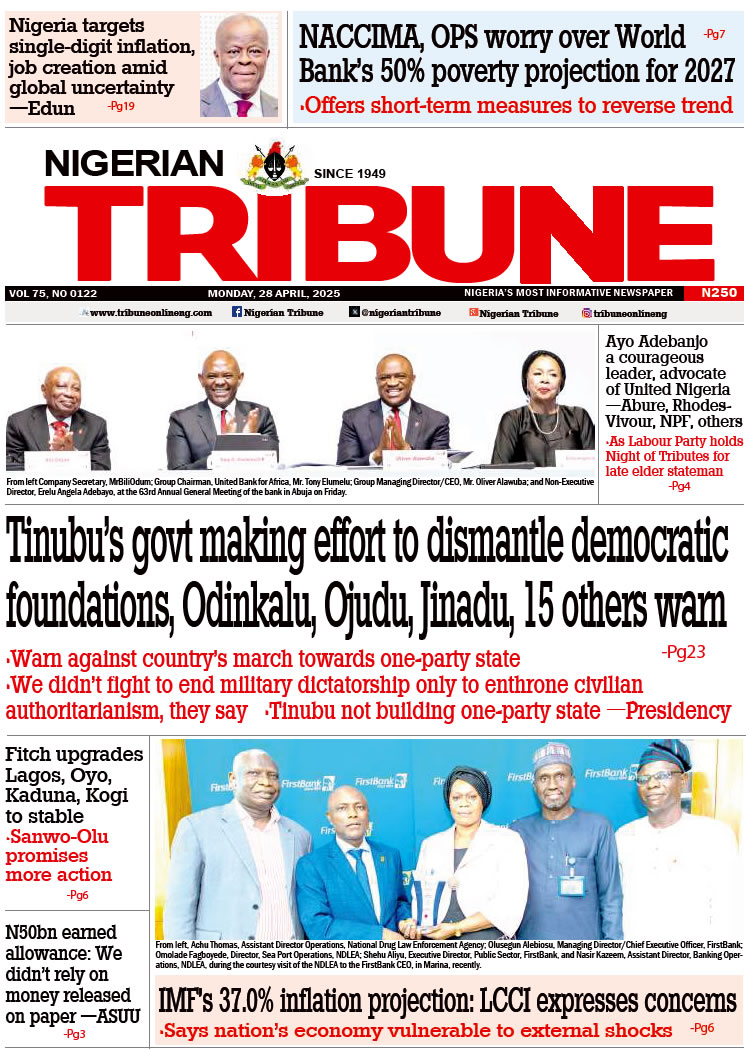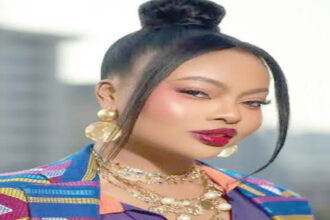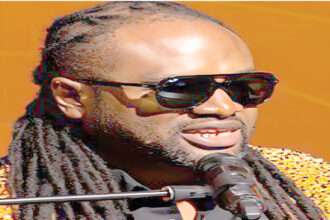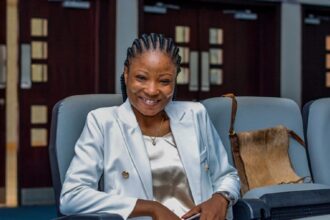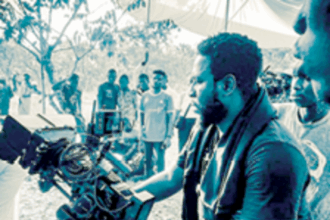Aderemi Davies is the brains behind AyaworanHO3D, a video documentary and media outfit committed to retelling African stories with modern perspectives. He told ROTIMI IGE how he turned his passion into a career, his AMVCA nominations and future plans.
BACKGROUND
I was born in Ibadan to the family of Mr. and Mrs. Abayomi and Dolapo Davies. I am the last of three boys. I started out my early education at Rotimi Comprehensive Institute as one of the earliest pupils of the school, when it took off at Iyaganku G.R.A. I, however completed my primary school education at ECWA Model School at Challenge, Ibadan. I proceeded to the prestigious Government College Ibadan (GCI), in Apata, for my secondary school education, where I finished as an Arts student. I had my first degree as a Bachelor of Arts from the premier university in Nigeria, University of Ibadan, in the field of Religion in 2011. I proceeded for a Master’s degree at the same university in the field of African Traditional Religion, which I completed in 2015 with a Ph.D grade.
As a young boy awaiting admission into the university, I took interest in graphics, personally developing skills in the art with the encouragement of my brother. Consolidating our creative abilities, we (my brother and I) started a small media business in 2006 called HO3D Nigeria, providing services in computer graphic design, printing and branding. Discovering more of our potential and waxing stronger in bond, our small partnership business expanded into a full-fledged multimedia outfit, offering top notch professional photography, film works, prints and branding services. I am a Christian with an unflinching faith in God. My brand name, which is a subset of the HO3D brand, is AyaworanHO3D.
AyaworanHO3D is a creative photographer, film maker and visual content developer. He extensively uses his art to celebrate African indigenous values, cultures, arts and identity in general, creating films, documentaries and projects that stimulate a Pro-African consciousness in his audience.
How did you get interested in making movies?
My interest in filmmaking can be traced to my family background. My parents, Mr. and Mrs. Yomi and Dolapo Davies, are veteran broadcasters and media moguls. They have both explored virtually every aspect of media and television, and growing up under a close-knit family like mine gave me so much exposure into the field. My brothers and I had the opportunity of learning a whole lot from my parents and I must say a large chunk of what we do now is building on the foundation of what they exposed us to. I personally see myself as a replica of my father and having spent my growing years understudying him, I was opportune to discover my interest and abilities quite early. We have always been film enthusiasts in my family, so growing up, I consumed a lot of film and television content, especially Nigerian movies.
So, when I finally found myself in media and production alongside my brother and partner, Adefemi Davies, it didn’t take us time to know we wanted to tell our own stories through visual contents-films, documentaries, commercials and photography. Though I never started out as a filmmaker as I see myself as evolving in my abilities over time till the point I am now, my journey through media hinged on developing interest and skills in various forms of visual representations. So with the mentoring of my elder brother and business partner Adefemi, I grew from computer graphics design to non-linear audiovisual editing to photography, cinematography and finally filmmaking.
Your experience thus far?
My experience so far, I believe resonates with the typical struggle of most Nigerian filmmakers. It is firstly about pursuing purpose, exploring potential and expressing oneself to the fullest.
Your short documentary was nominated for an Africa Magic Viewers Choice Awards (AMVCA). Tell us about it.
Wow! I still remember how I screamed when I saw my name on television. It was an unforgettable experience. We shot ‘Omidan; Styles defunct’ in March 2017. It has been one of my best documentaries so far, but the thought of it contending with works across Africa to finally get nominated for the best documentary at the AMVCA still beats me. The most humbling part is I never even got to submit the full documentary. The full documentary was about 11 minutes, but at some time I had to create a five-minute version for submission for a particular contest by Discovery Channel. So I uploaded the abridged version on YouTube for that purpose. I had challenges submitting the full documentary via the dedicated file clouding platform for the AMVCA online submissions and I eventually had to submit with the YouTube link. So, for a five-minute documentary to contend with hundreds of works across Africa (both long and short works), and eventually get shortlisted as part of just five finalists, it could only have been God.
What was the documentary about?
‘Omidan; Styles Defunct’ project was created as a photo and video documentary aimed at creating a depiction of the typical look of the young girl from the Yoruba cum African cultural background, emphasising naturalness and simplicity as attributes which characterised the essence of beauty in precolonial and early colonial Yoruba society. Central to the theme of the project was the showcase of indigenous hairstyles which are made with the natural hair; a culture which is fast being forgotten.
The documentary was aimed at taking the audience back in time by recreating the look and disposition of the young girl back in the days. There was also emphasis on showcasing the fastly forgotten local hairstyles (‘irun didi’) that used to be in vogue in times past. We cannot deny that the nature of the omidan back then is highly different from what we see now. Courtesy, modesty, chastity and virtue defined the young girl then; but nowadays, our young girls are pretty much outspoken and more self-aware. Modern influence is fastly eroding the mindset, attitude, drives and pursuit of our omidans and the young girl is gradually losing her identity and pivotal purpose in the society. The documentary was just meant to be a reminder.
The most beautiful part was working with the hairstylists, Mrs. Joseph and her two daughters at the Ogo Oluwa Beauty Salon in Olusoji area, Oluyole estate. They nailed the traditional hairstyles and perfectly took us back in time. We also had some amazing guys on our creative team, and working together with them made it achievable: Yetunde Oduwole, the make-up artist, Efe Chesterfield, John Osafele, Bayo Inspirar, Tope Ogungbe, Laolu, my brother Adefemi Davies, and all the amazing models, Yetunde, Barakat, Lateefah, Ebube, Ponmile, Iyanu, Oyinda and Esther. It was a full house and it was amazing working with them all. They all made it happen.
What is next for you?
I believe that sometimes success could be a distraction if you let it get to you. So, for me, while the AMVCA nomination was a great blessing which I’m grateful for, it only reminds me of the need to do more, press harder and keep shooting. It’s a validation that I’m on the right path and I just want to take my art to the next level. I have a couple of documentaries lined up, some I’ve shot and will soon be released; others as projects in pipeline. As for movies, while we are still exploring possible opportunities open to our debut feature film, ‘Of Love And Marriage’ (produced by my brother and me), we will commence production of another major project before the year runs out. I’m a passionate story teller and for now I just want to tell as much as I can.
Who are your mentors in the industry?
My first mentors are my father and brother. I’ve spent my entire life understudying my father and building on all I learnt from him. My brother, who happens to be my partner, Adefemi Davies, I must say, practically taught me all I know. Well, I can say he is my pathfinder, he shows me the basics and then I drive myself to develop those basics into a huge mass.
However outside these two, I learn from a number of great people from different fields I operate in. In the film industry, I cannot underestimate the influence of the works of the great Tunde Kelani on my worldview as a filmmaker and a storyteller in totality. His works keep striking me and we just cannot get enough of him.
Other great fillmakers I respect so much and whose works I hugely learn from are Kunle Afolayan, Abiodun Jimoh of Prodigy and Pens, Shirley F. Manso, Biodun Stephens Ladigbo, Uduak Isong Oguamanam and Mary Njoku of ROK Studios. Internationally, Steven Spielberg, Justin Lin and Micheal Bay are my biggest mentors. As a photographer, first on the list is Kelechi Amadi Obi, that’s my father in photography and thanks to social media, I watch him closely to pick as much as I can. Dayo Adedayo, TY Bello, August Udoh, Uche James Iroha, Lexon Art and Frans Lanting are great photographers whose works inspire me.
Someone who I really appreciate in the documentary field is Timmy Davies. Though we are more like contemporaries, I came in contact with his works via social media and I so much appreciate his creativity and art. Akin Alabi and Clarence Peters are two gurus who inspire me.
Rate the movie industry at the moment.
To me, the industry is doing pretty well, definitey there is still room for a lot of improvement but I think we are doing commendably well. The eyes of the world are on Nollywood and a lot of people have come to appreciate the efforts of our people. Nigerian movies are being highly celebrated out there. Across Africa and amongst Nigerians in diaspora, there is so much acceptance for nollywood titles and a lot of smart business-oriented industry folks are exploring the market hugely. At home here, I know a lot of folks still criticize Nigerian movies, comparing them with Hollywood productions, the truth is the terrain is different.
First of all the other two biggest movie industries, HollyWood and BollyWood both started way before we did, their market is massively larger than ours, the infrastructure at the disposal of the industries is nothing compared to ours and the funding is way larger thn ours. How can we then be comparing our baby with the outcomes from giants. Let’s appreciate our own, support it and give it time to grow. People should be reminded that whatever Nollywood has become now was as a result of the painstaking committment of individuals who saw the future and sowed their all into the industry even when it had no form. The Alade Aromires, The Zeb and Chico Ejiros, the Amaka Igwes, the Amatas, the Tunde Kelanis, the Tade Ogidans, the Wemimos, and a host of others. These people just believed even when there was little or no external support. They fought hard with all they had to create an industry that CNN now ranks the second largest movie making industry. Now we have a lot, technology, foreign investment, diaspora market, recognition platforms like the AMVCA etc. The future is brighter and the opportunities are limitless. Nollywood is growing and it shows potential to take over the world, lets all make this happen.
WHAT CHALLENGES DO YOU CURRENTLY FACE AND PROPOSED SOLUTIONS
The main challenge you face as a growing filmmaker here is funding. A good production even with a low budget still requires between three to five million. That’s for a low budget production. How does a young university graduate with a passion for making movies raise three million? Okay we hear a lot about Nollyfund by the Bank of Industry but I was surprise to find out that Jade Osiberu, whose movie “Isoken” was tagged to have been produced in association with BOI, had to drop her mother’s house as collateral. Now, how many people have parents with houses in Lagos like Jade? So we are back to square one. Thank God for platforms like ROK Studios and Africa Magic who commission film makers to create content. So I hoped ROK will be a way out, to my surprise I was told at ROK that they do not work with new filmmakers, except people with existing works that can be used as collateral. Invariably you are left with sourcing your funds yourself. Funding is a major challenge and that’s whats hindering our production quality from stepping higher. Most producers have to work with a limited budget and that reflects on the outcome someway. Only a few people can invest hugely and we see that in the weight of their titles. Movies like Dry by Stephanie Linus, The CEO by Kunle Afolayan, Tatu by Don Omope, The Wedding Party by Kemi Adetiba etc, reflect a high budget by Nigerian financial standards, and these productions can compete anywhere in the world. Infractructure to support filmming is also very limited. We here about film villages in some foreign countries where you have a lot of structures in place to facilitate your shoot. Here people rent flats or houses from property owners at huge amounts to shoot for a period. Perhaps if there were ready made buildings for that purpose available at minimal charges that would ease the production budget.
I believe Nollwood needs more investors who can come in with support funds to bail out producers. Yeah no one wants to joke with their money, even the government doesn’t, but sometimes a creative just wants an opportunity to express his or herself. These investors can fund the projects and “take ownership” of the project in terms of converting it to money. A creative might not know the business part of the industry especially how to convert a production to marketable product. The investors have that expertise. So fund the creative to actualize his dreams, and you bother about converting the art to returns. Maybe it can be a win win that way. The government however has the bulk of the job to do. Nollywood is the biggest thing communicating Nigeria to the world right now and its potentials are limitless. Nothing the government commits can be too much. Infrastructure should be provided. Laws should be made more flexible, and protection of rights properly enforced. Lastly more companies and organisations can also start seeing Nigerian films as an alternative advertising platform. Our movies have a wide reach, so brands can reach their target audience home and abroad by sponsoring a movie and adequately communicating their brand through it.
The opportunities are endless, Nollywood is the next big thing. I, AyaworanHO3D, am passionate about telling African stories and I’m going to be a part of that revolution called NOLLYWOOD.
Police Arrest 30 Footballers For Violating Lockdown In Kano
The Police Command in Kano on Tuesday confirmed it had arrested 30 youths allegedly involved in a football match in defiance to the lockdown order imposed on the state to contain the spread of the Coronavirus virus. Mr Abdullahi Haruna, the Commands’ spokesman, made the disclosure in an interview with the… Read full story
Seyi Makinde Announces New Appointments
Gov. Seyi Makinde of Oyo State has approved the appointment of Mrs Bolanle Sarumi-Aliyu as his Senior Special Assistant on Diaspora. This was contained in a statement issued on Tuesday in Ibadan by Moses Alao, the Special Assistant to the Governor on Print Media… Read full story
COVID-19: UN Study Reveals ‘Baffling’ Inequality In Distance Learning
A study by the United Nations (UN) and some partners has revealed a “baffling” disparity in digitally-based distance learning around the world. This is coming amid the coronavirus (COVID-19) pandemic that has forced the closure of schools in 191 countries, leaving most of the world’s students at home… Read full story
COVID-19: Another WHO Staff Tests Positive In Bauchi
The Bauchi State Government on Tuesday confirmed that another official of World Health Organisation (WHO) has tested positive of Coronavirus (COVID-19), bringing the total of active cases in the state to three. The Chairman, Bauchi State Primary Healthcare Development Agency, Dr Rilwanu Mohammed, disclosed this… Read full story
US Senate Passes Additional $484bn COVID-19 Relief Package
The United States Senate on Tuesday passed an additional coronavirus relief package worth $484 billion (N181 trillion) to address emerging public health and economic challenges occasioned by the pandemic. Specifically, this will replenish a depleted loan package for small businesses and provide funds for hospitals and coronavirus… Read full story
Kyari: Buhari Writes Borno Community, Says ‘Borno Has Lost An Outstanding Personality’
President Muhammadu Buhari has written the Governor of Borno, Prof. Babagana Zulum, and some leading traditional rulers, commiserating with them on the passing of their illustrious son and his Chief of Staff, Malam Abba Kyari. Mr Femi Adesina, the President’s spokesman, made this known in a statement in Abuja on Tuesday… Read full story
North Korean Media Silent On Kim’s Whereabouts As Speculation On Health Rages
North Korean state media on Wednesday made no mention of leader Kim Jong Un’s health or whereabouts, a day after intense international speculation over his health was sparked by media reports he was gravely ill after a cardiovascular procedure… Read full story
Coronavirus Hits Morocco Prison As 68 Test Positive
Sixty-eight people, mostly staff, have come down with the coronavirus at a prison in the southern Moroccan city of Ouarzazate, prison authorities said on Tuesday, without reporting any deaths. Earlier this month Morocco released 5,645 prisoners – some of them in poor health – to help reduce the risk of the coronavirus… Read full story
EDITORIAL: The Increasing Lawlessness Of Security Agencies
THE unusual circumstances which the advent of the COVID-19 global pandemic has foisted on many countries of the world, including Nigeria, has, in turn, elicited unusual official responses such as total or partial lockdown of activities. One of the significant consequences of restrictive orders is transient impairment… Read full story


